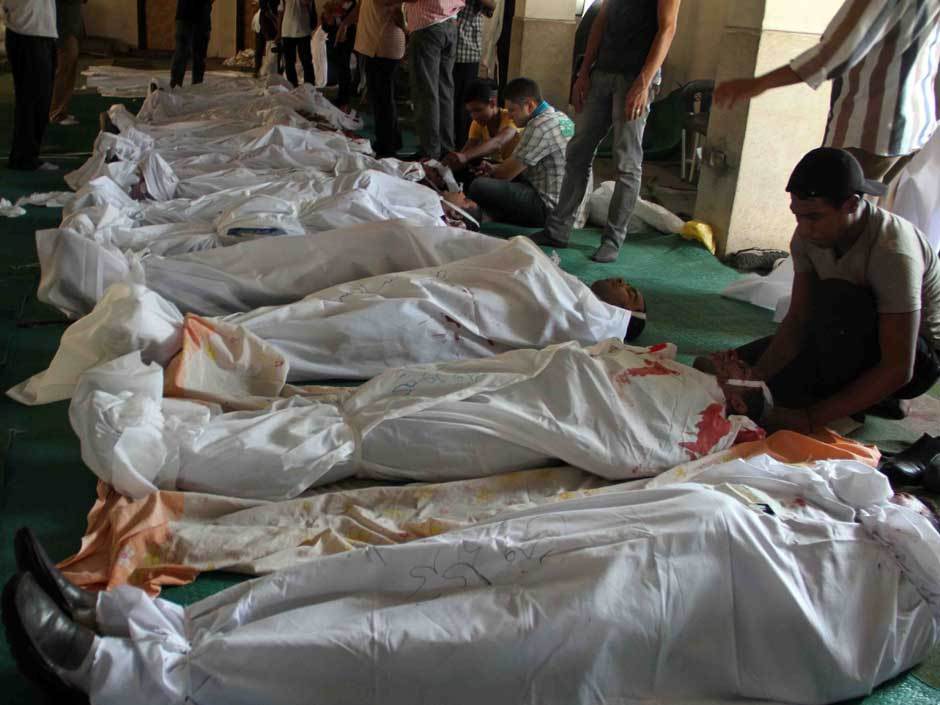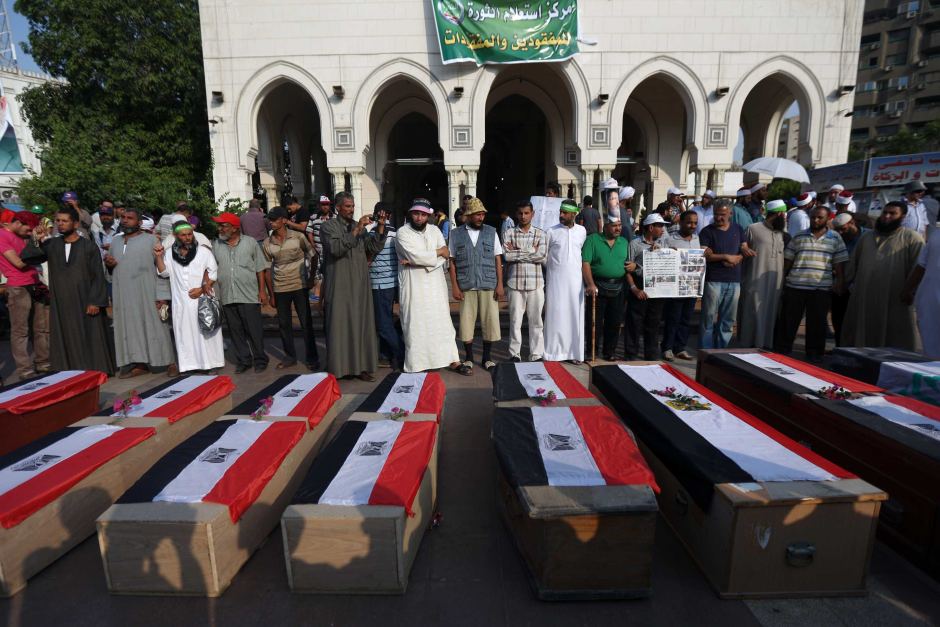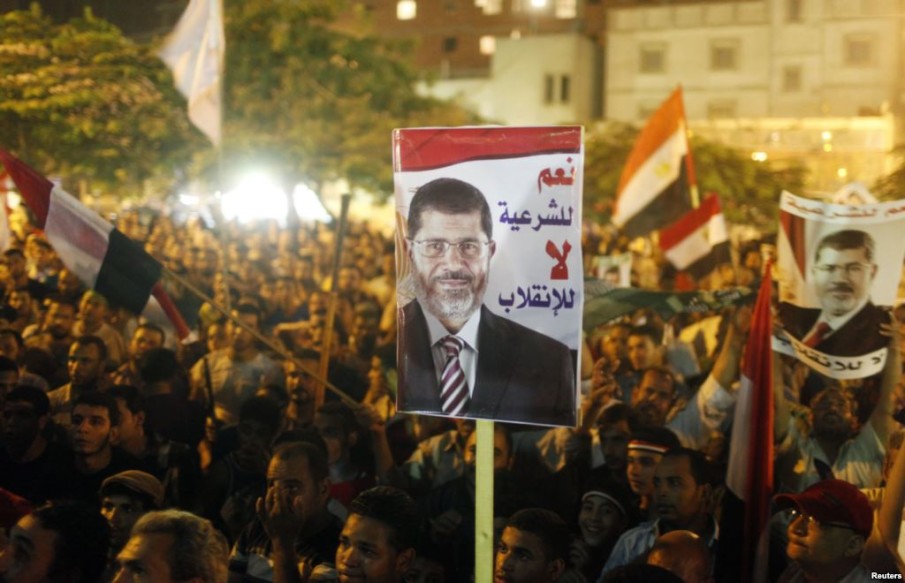Recent events in Egypt are a good study in the art of the politics of the real. As usual, the media talking heads just run with the latest video out of Egypt without context. They cover it as a human tragedy rather than what it actually is, a power struggle between political and religious factions in Egypt that is tied to the ouster of Mubarak in January of 2011.
To understand what is going on in Egypt, you have to recognize the factions that affect the social situation on the ground. It’s fairly simple. On the one hand, you have the Nationalist movement begun by Col. Gamal Nasser in the 1950s, when he and the Army overthrew the Egyptian monarchy. The Nationalists embrace secularism (as it goes over there), resistance to Western Imperialism (lingering resentment for the UK’s occupation of the country for 25 years after granting it independence), economic progress and some latent anti-Israel sentiments which were ironed out by Jimmy Carter when he promised massive aid to Egypt in return for a peace agreement with Israel.
The secularism of the the Nationalist movement means it is inclusive of the Coptic Christians which make up 10% of Egypt’s 85 million people. Within the Nationalist Movement is also the military, which is politically conservative, religiously diverse and very well armed, if not well trained, by U.S. standards. The U.S. has trained most of the country’s officer corps and about 1,000 new officers train in the U.S. each year. It’s a part of our “aid” to Egypt.
The current ruler/Defense Minister of Egypt, Gen. Abdel Fattah al-Sisi, is a 2010 graduate of the Army War College in Pennsylvania. The Army has been generally popular with Egyptians since the 1973 Yom Kippur War with Israel. According to Egyptian history, the Army “won” that war after impressive early gains into the Sinai resulted in an Israeli counter-attack that encircled one Egyptian Army and had Israeli tanks driving into Egypt and pressing to within 65 miles of Cairo itself. The UN-brokered ceasefire basically saved Egypt from yet another humiliating military defeat.
The Egyptian military is also a capitalist enterprise. It ‘owns’ 20-30% of the Egyptian economy. It does not rely on the government for funding as much as it does on U.S. and foreign aid and the hotels, rental car agencies, car dealerships, factories and retail outlets that it operates with low-paid conscript manpower.
The other faction is the Muslim Brotherhood, which is Islamist rather than Nationalistic in outlook. It believes that their interpretation of Islam is the correct one (they are Sunni), and that it can be used to promote Muslim unity (as opposed to Egyptian unity), cultural preservation, public order and of course, death to Israel, the U.S. and the UK. It also holds that the Egyptians are destined to be the seat of the Caliphate for the Muslim world. Since taking power they have cracked down on the Shiite and Christian religious minorities.
Prior to the ouster of Mubarak, the Muslim Brotherhood were outlawed and operated underground with a fanatical membership of between 100,000 and 600,000 people. The Brotherhood had a 4-year process of incremental membership which made it very hard for the government to infiltrate with informants. When the liberal secularists began their protests against Mubarak, the Muslim Brotherhood was quick to exploit, organize and ultimately co-opt the protests. They then won both the parliamentary and Presidential elections in what was called “fair and free,” but was riven with fraud and intimidation of the opposition.
Now, since taking power, the Muslim Brotherhood has tried to consolidate its power, not against the unarmed secularists, but against the Army. The Brotherhood tried to vest power in Morsi that would have made him an even bigger dictator than Mubarak was accused of being. They also tried to reshuffle the leadership of the military and make it subservient to the civil authorities.
Morsi was going around claiming that he was the Commander in Chief of the Armed Forces. Morsi also renounced the peace treaty with Israel and apparently facilitated the use of tunnels in the Sinai by Hamas to attack Israel. This abrogation of the peace treaty jeopardized U.S. aid to Egypt’s military. Terrorist attacks by Hamas out of the Sinai against Israel would have poisoned the generally good (if not bragged about) security and intelligence cooperation that exists between Israel and the Egyptian Army. Simply stated, Israel helps Egypt by keeping the (unliked) Palestinians out of the Sinai, and Egypt helps Israel by preventing the Sinai from being used by Hamas to stage from or hide in.
The protests against Mubarak were animated by economic conditions, something the capitalist Army was being hurt by as well. Rather than take steps to ease inflation, reduce gas shortages, improve electrical service and reduce food prices, Mubarak did something entirely stupid. He stopped importing wheat.
Back in the days of the Romans, Egypt was Rome’s bread basket. The empire imported wheat from Egypt. Now, Egypt imports wheat from the West. And because Egypt still grows wheat using the exact same methods used to feed the Roman Empire 2000 years ago, it’s totally inefficient to feed the country. Recalling that Egypt’s Army runs about 25% of the economy, having people spend all their money just trying to get enough food to eat was hurting business. That’s why Morsi was toppled and that is why the excuse was “failing to meet the demands of the Egyptian People.” It is also the reason the Army is preparing a long list of economic crimes with which to charge Morsi. Tourism in the country is gone, foreign investment is gone, there is no gas, the power is on only a few hours a day in Cairo, inflation is rampant and the bottom half of the population barely has enough to eat.
Already have an account? Sign In
Two ways to continue to read this article.
Subscribe
$1.99
every 4 weeks
- Unlimited access to all articles
- Support independent journalism
- Ad-free reading experience
Subscribe Now
Recurring Monthly. Cancel Anytime.
It’s easy to see the actions of Morsi and the Muslim Brotherhood as being anti-western and anti-Israel, but I think taken all together, they were pointed at breaking the power of the Army. I think the current reports of the Army massacres against spontaneous democratic protests are suspect because it imagines that the liberal-secular segment of the population supports Morsi, but they don’t. They were defeated by Morsi and the Muslim Brotherhood in that election. It also appears that quite a few of the protests are staged for the cameras. A rather glaring example of that can be seen here.
I’m sure that people are being killed, but it is not beyond the pale of Islamists to shoot their own people to score political points for their cause. They strap bombs to women and kids without the slightest moral reservation. It is not uncommon in the West Bank for Hamas to stage a “peaceful” protest and then have concealed gunmen fire on the Israeli police hoping that they can provoke deadly retaliation for the media to cover. Sometimes the gunfire is blamed on Israeli “snipers,” and then the fake casualties are picked up by fake medical personnel driving an ambulance that always seems to be just seconds away when someone gets shot. I would also be skeptical of casualty collection points located in mosques run by Morsi-supporting clerics.
Take a look at this picture:

(Image Courtesy: NationalPost.com)
Plenty of people on SOFREP have seen gunshot wounds and other battle injuries. They’ve looked at a lot of blood. So have I. It never turns orange. It doesn’t stay bright red on a sheet for very long. Blood has iron in it – when it is exposed to air it rapidly oxidizes and turns a brownish dark-purple in color.
Here is another photo of what even ABC news has to call a “fake” funeral with “empty” coffins:

(Image Courtesy: ABC.net.au)
You’ll also see pictures of dead bodies all lined up very carefully. They ALL have their eyes closed and you will notice that some of the heads are turned towards the camera, never away. These dead bodies tend to have none of the bloat and swelling around the cheeks and eyes that tends to occur in death when its 100 degree outside. None of them have the pale skin color of death.
While I do not doubt that there are casualties in the protests, I submit that quite a bit of what we are going to see is staged for the media by the Muslim Brotherhood. They would very much like to have the U.S. and other countries see the Egyptian military as the bad guys and suspend all aid.
The Muslim Brotherhood is working a plan to isolate the Army and then break them once and for all. They are posing the protests as being the liberal secularists which supports the Army. They are attacking the Coptic Christians because they support the Army, too. They are attacking government buildings and police stations. They are using violent actors within peaceful protests to provoke the military, and if the injuries are not severe enough they are faking deaths, mass funerals and injuries for the cameras in the attempt to turn U.S. public opinion away from the Army and towards the Muslim Brotherhood. I think the Us may have played a role in this behind the scenes that is not obvious.
Back in January of this year the U.S. agreed to deliver twenty F-16s to Egypt. There was a hue and cry about us “arming” the Muslim Brotherhood that came from both sides of the political aisle. What is not known is that the Muslim Brotherhood has no more control over the actions of the Egyptian Army than I do.
I think we were sending a message there, a message of support for the real power brokers in Egypt, the Army. They don’t need the jets. They have nearly 300 F-16s right now and 1,000 Abrams tanks, too. We didn’t give Morsi and the Muslim Brotherhood $1.6 billion in cash, we gave jets to the Egyptian Army. That’s different. We also declined to call the ouster of Morsi a coup d’état because it would have meant that we had to suspend aid to the military. The President’s remarks on Morsi being removed have been wishy-washy, as well. I don’t think the removal of Morsi and the short dicking of the Muslim Brotherhood by the Army came as any surprise to the White House.
(Featured Image Courtesy: Voice of America)












COMMENTS